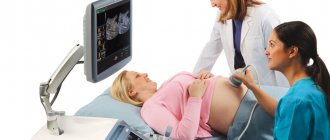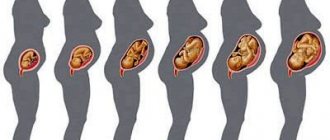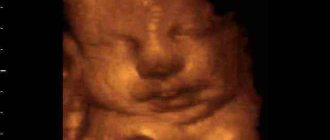From the 31st week of pregnancy, the baby takes its final position in the uterus. In addition to the fact that it is already difficult for the child to make turns, the expectant mother also feels stiffness in her movements and clumsiness. By this time, some pregnant women find it difficult to walk. The expectant mother's breasts are also preparing for the upcoming feeding function.
In the third trimester, you should undergo a complete medical examination. An ultrasound scan at 31 weeks of pregnancy is mandatory. At this stage, this study is able to identify possible threats to the course of pregnancy and at the same time check the condition of the child.
The degree of maturity of the baby’s lungs at 31 weeks of pregnancy is equal to one. For a successful birth, you must listen to all the recommendations of your obstetrician-gynecologist. Also, during the entire period of pregnancy, you should not skip an ultrasound; this diagnosis must be completed on time. After all, an ultrasound examination is necessary not only to take a photo of the baby and find out its gender, but also to monitor the child’s condition, in order to ensure that developmental indicators correspond to the deadline. If the images are taken using 3D ultrasound, then the iris of the eye can be seen in the photograph.
Interesting Facts
| Options | Indications |
| Time from conception | 29 weeks |
| Period by month | 31 weeks |
| What month | 8 |
| Dimensions and weight of the fetus | 415 mm, 1500 g |
| Uterus dimensions | VDM - 29-31 cm |
| Pregnant weight | From the beginning of pregnancy 8-14 kg; over the last week no more than 400-500 g |
Your baby is the size of
A pineapple
415 mm Size
1500 g Weight
Congratulations on your maternity leave! Dedicate your free time to your health, proper rest and preparation for the birth of your child. There is very little left. How many months? The 31st obstetric week of pregnancy is almost 8 months of gestation, since doctors, for convenience, believe that there are exactly 4 weeks in 1 month. According to the usual calendar calculation for the average person, you have 7 months of gestation, with about 2 months left before giving birth. Let's find out what happens to the baby and the pregnant woman during this period.
Good to know
Leakage of amniotic fluid
What is placenta previa?
Aromatherapy during pregnancy
Pregnancy, childbirth and breech presentation of the fetus. How to fix?
Low position of the fetal head during pregnancy: why is it bad?
Position and presentation of the fetus
All texts for pages about mother and baby were kindly provided by RAMA Publishing - these are chapters from the book by Svetlana Klaas “Your Favorite Little Man from Conception to Birth”, reviewer Irina Nikolaevna Kononova, Candidate of Medical Sciences, Associate Professor of the Department of Obstetrics and Gynecology of the Ural State Medical Academy (Ekaterinburg).
Feelings of the expectant mother
The abdomen continues to grow, the size of the uterus reaches 29-32 cm from the cervix to its bottom. The average weight gain is 12 kg. The figure may vary depending on how much you weighed before pregnancy, what lifestyle you lead and how you eat. Avoid gaining too much weight: extra weight will make it difficult for you to move now and will complicate labor and delivery. Try to move, walk, exercise on a fitball or swim.
The uterus puts pressure on neighboring organs, which is why pregnant women at 31 weeks complain of shortness of breath, heartburn and sometimes even nausea, frequent urge to go to the toilet and a tendency to constipation.
Many women experience training contractions in the 3rd trimester. They usually manifest themselves as pulling sensations in the lower back and lower abdomen. They pass on their own and do not contribute to premature dilatation of the cervix.
Vaginal discharge
At 31 weeks of pregnancy, under the influence of estrogens, they may become more abundant and liquid, but should also normally be light in color with a sour-milk odor. If your discharge suddenly becomes thick and white, plus you experience itching, discuss with your doctor the necessary treatment for thrush. It is necessary to get rid of it before birth so as not to infect the baby.
Fetal development
The baby already looks almost like a newborn, only very small. The remaining time he will actively increase body weight. Already at 31 weeks, the child’s weight is 1.5 kg, and his height is up to 41.5 cm. He actively reacts to external stimuli and is capable of remembering due to the active maturation of parts of the brain.
Most likely, you have already noticed that your child has his own daily routine. He sleeps most of the day, and moves when he is awake. Now his movements are becoming especially noticeable to the mother, since there is less and less space for them in the womb. By the nature of the movements you can guess about the child’s well-being. If he doesn't have enough oxygen or you are in an uncomfortable position for him, he will announce this with strong thrusts.
How to count movements?
In 12 hours, a baby should normally move an average of 10 times. If your numbers are much lower or higher, tell your gynecologist. Physical activity can be affected by both bad weather and the emotional state of the mother. But control by a specialist still won’t hurt.
What's happening
From this time, the child begins to experience pain when he is exposed to an unpleasant effect. And if you accidentally press down on your belly, the baby will instantly show its indignation by actively moving.
At the 31st week of pregnancy, the development of the brain continues: protective membranes appear on it, and the transmission of nerve impulses accelerates. The fetal liver is improving, it produces bile and is now ready to independently cleanse the blood of toxins. The pancreas has fully formed, and the child’s body is already actively producing insulin, which is necessary to maintain normal glucose levels.
Subcutaneous fat continues to accumulate, which is what gives newborn babies their plump appearance. The baby sleeps most of the day, and when awake, he loves to suck his thumb. At the same time, the baby swallows amniotic fluid, which is why he sometimes gets hiccups. At such moments, you may feel rhythmic shuddering in your stomach. By the 30th - 31st week of pregnancy, the fetal pupils are able to react to light, and if you point a flashlight beam at the stomach, the baby will close his eyes and try to turn away.
Tests and ultrasound
At 31 weeks of pregnancy, your gynecologist may refer you for a second scheduled visit to your general practitioner. During the consultation, he will pay special attention to your blood pressure and the condition of your legs: is there any swelling, varicose veins.
The purpose of the ultrasound this week is to determine whether the parameters of fetal development correspond to established standards. The specialist also listens to the heartbeat and determines the type of presentation. For pelvic, you will be scheduled for another test no later than 36 weeks.
Indications for use
3D examination is carried out at the request of the woman. However, there are also medical indications for this procedure, including:
- pregnancy resulting from IVF;
- surrogacy;
- pregnancy complications requiring clarification of the fetal condition;
- suspicion of malformations of the soft tissues of the face. Most often these are cleft lip and cleft palate;
- suspicion of abnormal development of the nervous system;
- suspicion of chromosomal pathology.
A doctor may suspect a problem with a routine ultrasound examination or the results of blood tests.
These are biochemical markers of the condition of the fetus, which are included in the mandatory list of examinations during pregnancy. Deviation of their values from the norm may indicate developmental defects. You can also have these tests done in a laboratory at an affordable cost. Accurate diagnosis of the fetal condition is very important and can determine pregnancy management tactics. A high-quality photo or video with your future baby will become one of the highlights of the family archive!
What to discuss with your doctor
- Many pregnant women complain about breast formations in the 3rd trimester of pregnancy. Lumps and lumps in the mammary gland are most often associated with the natural preparation of the organ for lactation and resolve on their own. However, consultation and examination by a specialist is still necessary.
- If you are planning to breastfeed, you should discuss in advance with a specialist the technique of breastfeeding, find out in what positions you can and sometimes need to feed, and whether you need to express. Most of us have very rough ideas about feeding and hope that “nature will tell.” However, in reality everything turns out to be a little more complicated, and it is better to be prepared for this.
Possible complications
The thirty-first week of pregnancy is a relatively calm time for a woman’s health. Set yourself up for the best. If you are concerned about unusual sensations, be sure to consult your doctor.
If your lower abdomen hurts at 31 weeks of pregnancy
To prepare the pelvis for childbirth, the body produces the hormone relaxin, which makes ligaments and bone tissue softer and more elastic. Because of this, many pregnant women complain that their bones hurt at 31 weeks of pregnancy, especially the pelvic and pubic bones. There is no escape from these uncomfortable sensations. However, if the pain becomes unbearable, consult a gynecologist. Severe pain in the perineum, when it is difficult to even sit or stand, may be a sign of symphysitis - inflammation of the pubic bone. The only possible solution is a caesarean section.
Method capabilities

You can examine the facial features, its expression, and count the fingers. This helps doctors make sure that everything is fine with the child, because during the examination, developmental defects are clearly visible, which may be indications for termination of pregnancy. Accurate gender determination is one of the advantages of 3D ultrasound. It is especially important to know this in case of hereditary pathology, when it depends on the gender whether the baby will get sick or remain a carrier of the disease.
Lifestyle at 31 weeks
Even in the third trimester of pregnancy, when the former ease of movement disappears, we advise you not to forget about physical activity. Daily exercise will relieve back pain. Stretching exercises, gentle bending to the sides, twisting and breathing exercises will significantly improve your condition.
Regular walks in the fresh air have a beneficial effect on the circulatory system and relieve headaches. Choose comfortable shoes, bring your favorite drink and enjoy.
Yoga and swimming during pregnancy will help you relax, stabilize the respiratory system, and improve blood circulation. It is believed that these types of activities also help the baby to position himself head down in the uterus.
How is the examination carried out?
No preliminary preparation is required to conduct a 3D ultrasound.
You do not need to bring anything with you; all consumables are included in the cost of the procedure. The patient lies down on the couch and frees her stomach from clothing. The doctor applies a gel that improves contact between the device’s sensor and the skin. The examination lasts 45-50 minutes. The doctor prints the resulting image on photographic paper and gives it along with a description of the results. You can record to a disk, flash drive or other media.
The medical examination is carried out by a gynecologist; according to indications, three-dimensional ultrasound is supplemented with Doppler examination of blood flow in the uterine artery and umbilical vessels. You can also record images in 4D format. At the same time, you see not only the appearance of the unborn child, but also his every movement.
Checklist for 31 weeks of pregnancy
- Complete a sick leave certificate and give it to your employer. Then you will receive maternity benefits.
- Decide which maternity hospital you will give birth in. Attend an open day at your chosen institution. This is a great way to talk to your doctor, find out the specifics of staying in the maternity and postpartum wards, and find out what you can and cannot take with you.
- Make a shopping list for your baby: stroller, crib, clothes, diapers. It’s better to do this in advance so that you don’t have to run around shopping in a panic in the last weeks.
Take courses for expectant mothers at the Women's Medical Center. We will tell you how to properly prepare for childbirth, how to care for a newborn, how to establish natural or artificial feeding.
Future dad's fears
Many fathers, while waiting for their Baby, discover fears. And the most insidious of them is the loss of a beloved woman and child. In addition to the fear of losing a loved one and a tiny loved one, others are added: the fear of being abandoned and unwanted, the fear that a boy will be born and not a girl (less often the other way around), that you will have to be tied to home, that there will be problems with finances, that the amount of freedom and rights will decrease, and responsibilities will increase, etc. And that is not all!
If dad's fears, which he prefers not to talk about out loud, turn out to be close to mom's fears, the worries completely deprive him of peace and sleep.
There is only one way out - to recognize the existing fear and have the courage to defeat it. To do this, depending on the specific fear, you need to tell yourself:
- I'm afraid of losing my wife and child, but I will do everything possible to prevent this from happening. If something irreparable happens, I will try to be courageous and persevere through what happened;
- I'm worried about having a girl and not a boy. All fathers want sons, but I understand that it was I who “gave” the gender to the child. Therefore, I will bear the news that I am having a girl with courage. Gradually, of course, I will love the baby - perhaps (like most fathers), even more deeply than my son;
- I'm afraid that I won't cope with the role of a father. But I learn - from books, from friends, from schools for fathers, from the Internet - the necessary minimum of what I have to do, and I can handle it;
- I'm afraid to seem funny or ridiculous, accompanying "my belly." But who if not me? This means that I will give a damn about everyone and will walk with my beloved and our Baby wherever they like, and also go with them to cafes, theaters, the circus, the zoo, etc.;
- I am terribly embarrassed by my partner’s request to attend courses for future fathers or lectures at a school for future parents. But I will overcome my embarrassment (am I a man or not?) and give in to the obsessive desire of my beloved. Moreover, according to experienced fathers, they give a lot of practical advice there, and our mother has recently had a girlish memory;
- I am afraid that, having lost my wife’s salary, I will not be able to provide for my family financially. But I will think about how to redistribute all expenses, what to give up, in order to free up funds to maintain the well-being of mother and baby and purchase everything necessary for the child. And if necessary, I will find additional income;
- I'm afraid I'll go crazy if I'm confined to the house all evenings and weekends. But I understand that my fatigue and desire to relax are incommensurate with the fatigue and need for rest of a future and especially a young mother. This means I will resume meeting with friends or favorite activities outside the home when Baby grows up.
Your Baby is waiting for you to overcome all fears yourself and convince your mother, and also make your Baby feel that they have nothing to fear when they are with you.









